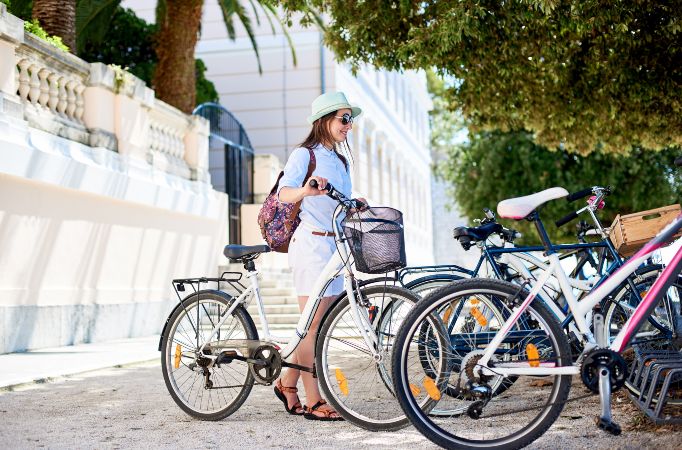
First Croatian national cycling strategy set to boost cycling in the country
22 Dec, 2023
This year, the first national cycling strategy was adopted in Croatia. Read on for an indepth look at the development of the strategy and what this means for cycling in Croatia.
On July 20th the first-ever Croatian National Cycling Strategy was adopted and presented by the Ministry of Sea, Traffic and Infrastructure. The Strategy envisions the increase in the use of bicycles for daily commuting and travel and improvement in the safety of cyclist in traffic. It covers the period from 2023 to 2027 and comes with a total investment of €166.7 million. Croatia is the 11th European country with a proper national cycling strategy in place.
The National Plan on the Development of Cycling Transport for the period from 2023 to 2027 sets two main target goals with financial breakdowns for each year over the five-year period:
- Increasing the use of bicycles for daily commuting and travel.
- Improving the safety of cyclists in traffic.
To achieve these goals, the plan outlines specific measures. The first goal of increasing bicycle use in daily commutes or travel will be accomplished through three measures: by establishing public bike share, and cargo bike systems, building bicycle infrastructure, and conducting a national campaign promoting bicycle use.
The second goal – improving the safety of cyclists – also involves three measures: creating preventive educational activities and projects on cycling safety in road traffic, improving the legislative framework, and assessing potentially dangerous sites and locations with suggestions to enhance cycling safety.
This National Plan for the development of cycling transportation aims to construct more than 850 km of additional bicycle roads alongside local, regional, and state roads. The exact number is unknown due to varying figures for planned bicycle roads in cities. The total investment earmarked to achieve these two goals over the next five years is €166.7 million.

ECF's national member, Sindikat Biciklista from Croatia, believes the Plan is a step in the right direction.
"We've been following many cycle tourism initiatives in recent years, but without a comprehensive approach at the national level, their impact remains limited," Davorin Belamarić told us.
Davorin also acknowledged that Croatia's cycling infrastructure, a key element in the development of cycling, lags behind other European countries.
"This plan represents a serious approach to financing cycling infrastructure for the first time in Croatia, and we believe that it will make a significant difference,", Belamarić added.
Sindikat Biciklista are optimistic that the National Plan will be implemented with the same enthusiasm and professionalism witnessed during its preparation, and they remain hopeful that Croatia will finally harness the potential gains from cycle tourism and an increase in urban cycling.
Performance indicators will be systematically monitored through data collection from specified official sources and the analysis and comparison of selected outcome indicators. Annual reports on the implementation of the National Plan will be published on the Ministry of Sea, Traffic, and Infrastructure's website.
The analysis of the state of cycling has shown that too few people use bicycles as a mode of transportation for their daily commute and leisure activities. The low quality of the existing cycling infrastructure increases the risk of traffic accidents. Therefore, the analysis concludes that there is a significant need for the development of cycling transportation for larger groups of people.
The National Plan presents cycling data from older research that describes the state of cycling in Croatia. When examining the multimodal distribution of travel in the Eurobarometer survey from 2014 (Special Barometer 422b: Quality of Transport), cycling in Croatia accounted for 6% of trips, which was 2% lower than the EU's average. However, it is 30% percentage points lower than the Netherlands and 17% percentage points lower than Denmark, who were the EU's champions of cycling, respectively, at that time. Moreover, 2010-2020 data from the Bureau of Statistics showed that the bicycle market is growing with over 100,000 bicycles recently being imported. According to the Strategy, this indicates a significant demand for bicycles in Croatia and, with this, a greater potential for increasing the share of bicycle use as a mode of transport.
The adoption of The National Plan on the Development of Cycling Transport is a result of the Interreg Programme “Danube Cycle Plans“ partnership, of which several Danube-bordering countries have been a part. This project aims to facilitate the development of cycling policies at both national and transnational levels.
Croatia's first-ever strategic document on cycling sets an optimistic path for the further development of cycling in the country, and we are hopeful that this strategy will encourage other neighbouring countries to follow and develop their own cycling strategies.
Find The National Plan on the Development of Cycling Transport here.
Contact the author
Recent news!
Upcoming events
Contact Us
Avenue des Arts, 7-8
Postal address: Rue de la Charité, 22
1210 Brussels, Belgium
Phone: +32 2 329 03 80
Email: office@ecf.com









